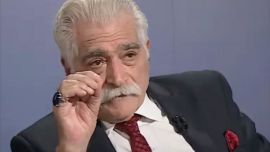All roads lead to Rome, as they say. Apart from my son Martin’s birthday, today might be the 50th anniversary of the election of Héctor Cámpora, the originally conservative dentist prior to his seven-week presidency who has somehow given his name to today’s powerful Kirchnerite grouping, but this column will leave the celebrations to the no longer so young La Cámpora militants (also on the pretext that I was living in Vienna in 1973, with no personal input to offer) and focus on another anniversary – the 10 years of Pope Francis coming up next Monday.
Despite working in the press, this columnist may have been one of the last people in this country to latch onto the dramatic news of an Argentine pontiff. On that day I was walking down Santa Fe avenue when, passing a shop selling televisions, I saw the screens flashing: “Habemus papam, en instantes habla Bergoglio!” My own interpretation of that was: “OK, the white smoke has finally gone up and some reporter will be talking to Cardinal Bergoglio to get an Argentine take on the new pontiff but who on earth could he be?” Being otherwise engaged, it was some time before I was enlightened.
It was not until he reached the primacy of the Argentine Church in 1998 that I became aware of the existence of Jorge Bergoglio. At that point the Church hierarchy was still stuck with a “cross and sword” identification with the 1976-1983 military dictatorship starting with Buenos Cardinal-Archbishop Juan Carlos Aramburu (1975-90) which his Italian-born successor Antonio Quarracino did little to amend.
And neither did Quarracino’s Jesuit successor initially with a low-profile start, not even receiving the red hat automatically accompanying the Buenos Aires archdiocese until 2001. Even if Bergoglio was actively encouraging slum priests (such as Father José María ‘Padre Pepe’ di Paola, interviewed by Jorge Fontevecchia in last Saturday’s newspaper) at grass roots level from the start, he was doing good by stealth while his media splashes largely served to perpetuate the conservative image of the hierarchy by running afoul of the Kirchner presidential couple who had co-opted the progressive camp. The latter had sufficient doubts from their first experience of a Bergoglio May 25 Te Deum sermon in 2004 to switch the venue to Santiago del Estero next year but their 2006 return to the Plaza de Mayo cathedral led them to a “never again” verdict against the current Pope – Bergoglio’s words against “hatred and confrontation” and “bullying manipulation” in his homily were taken very personally in particular by a woman who likes to see herself as the target of hate speech. In 2010 the cardinal again clashed with the Kirchners when he opposed the legalisation of gay marriage in the strongest terms – describing matrimony and maternity as semantically inseparable, he viewed the reform as going beyond “a simple political struggle” to be “a frontal rejection of the law of God … who had given man and woman the mandate to grow, multiply and dominate the earth,” as well as “demonic envy.” This stance gave him a strongly conservative tag but at least he never had to defend the rights of unborn life against abortion while in Argentina as Cristina Fernández de Kirchner was pledged to vetoing any such legislation during her presidency.
Kirchnerite hostility peaked in the immediate aftermath of Bergoglio’s ascent to the papacy (with their allied media playing up his alleged abandonment of fellow-Jesuits when their local superior during the military dictatorship) but in less than a week Fernández de Kirchner had staged a complete U-turn to fall in line with the general popular enthusiasm over an Argentine taking charge of the keys of Saint Peter. Since then the hostility has increasingly come from the other end of the political spectrum with an urban legend of a “Peronist Pope” – various leaders of the centre-right opposition question his pobrismo, or glorification of poverty, which (they charge) perpetuates a core Kirchnerite constituency and stunts Argentine growth.
But any close reading of The Bible will show that the Pope “can do no other” (to quote Martin Luther) because even Das Kapital of Karl Marx contains more to glorify capitalism than the New Testament. Furthermore, the papal concern is not only the bodies of the poor but also the souls of the rich. In one of the wisest reflections on power ever, the philosophical Roman Emperor Marcus Aurelius wrote: “As emperor I am limited by the frontiers of my empire; as a simple human being I belong to the universe.” Without quoting Marcus Aurelius, the Pope would apply a similar logic of the rich being trapped within their wealth and the most affluent countries by their consumer societies, missing out on a common humanity.
Impossible to dodge the issue of clerical abuse as this century’s leading critique of the Church. Here there are two extremes – denial (along with shifting the errant priests from diocese to diocese) and the kind of exposé which presents the Church as little more than a club for pederasts, grossly unfair on the millions of people dedicating themselves to spiritual and charitable work worldwide. This columnist suspects that one reason why pinning this ultra-negative tag on the Church has caught on so massively is that it enables people to make the transition into the relentless secularisation of this century marked by its smartphone Alephs without guilt over leaving behind two millennia of Christian virtues (also tainted by violent persecutions and wars and much else quite apart from the abuse, but there is such a thing as throwing out the baby with the bathwater). All of which is no excuse for the abuse.
God save King Charles, according to the British national anthem, but in today’s world Pope Francis will need his God even more.



















Comments